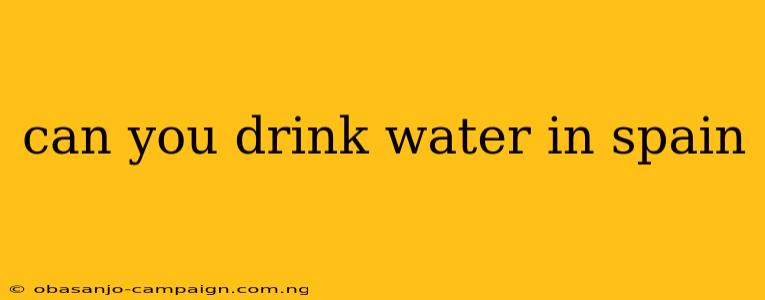Spain, a country known for its vibrant culture, stunning landscapes, and delectable cuisine, is a popular destination for travelers from around the globe. However, when it comes to hydration, a common question arises: is it safe to drink tap water in Spain? While tap water is generally safe to drink in most of Spain, there are some areas and circumstances where it's advisable to exercise caution and consider alternative sources of drinking water. This article will delve into the intricacies of tap water safety in Spain, providing you with the information you need to make informed decisions about your hydration while exploring this beautiful country.
Tap Water Safety in Spain: What You Need to Know
Spain has a robust water infrastructure and generally maintains high standards for water treatment. In most urban areas and tourist hotspots, tap water is considered safe for drinking. However, there are a few factors that can influence the quality of tap water in certain areas:
Regional Variations in Water Quality
While Spain's overall water quality is good, there are regional differences that can affect the taste and safety of tap water. In some rural areas or smaller villages, the water treatment infrastructure may be less advanced. Additionally, the geological composition of the region can also influence the water's mineral content, sometimes resulting in a slightly salty or metallic taste.
Seasonal Considerations
During the peak summer months, when temperatures are high, there might be a slightly higher risk of bacteria or other contaminants entering the water supply in certain areas. This is due to increased water usage and potential for contamination in older water pipes.
When to Consider Bottled Water
While tap water is generally safe in Spain, there are a few situations where it's best to err on the side of caution and opt for bottled water:
1. Rural Areas and Smaller Towns
In more remote or rural areas, the water treatment facilities might not be as advanced as those in larger cities. If you're traveling to a smaller town or village, it's generally a good idea to stick to bottled water, especially if you have any concerns about your health.
2. Unfamiliar Water Sources
If you're unsure about the source of the water, whether it's a public fountain or a private well, it's best to avoid drinking it. Stick to bottled water to avoid any potential risks.
3. Gastrointestinal Sensitivity
If you have a sensitive stomach or are prone to gastrointestinal issues, it's a good idea to play it safe and choose bottled water. This will minimize the chances of experiencing any digestive discomfort.
4. Uncertain Water Quality
If you have any doubts about the quality of the tap water in a particular area, whether it's due to a recent water main break or other concerns, it's always better to err on the side of caution and use bottled water.
Tips for Staying Hydrated in Spain
1. Carry a Reusable Water Bottle
One of the best ways to stay hydrated and reduce your reliance on single-use plastic bottles is to carry a reusable water bottle. Fill it up with tap water in areas where it's safe to drink or purchase bottled water and refill it throughout the day.
2. Choose Filtered Tap Water
Many cafes, restaurants, and hotels in Spain offer filtered tap water. This is a great alternative to bottled water and a more sustainable choice.
3. Opt for Bottled Water from Reputable Sources
If you do decide to purchase bottled water, choose brands with a good reputation for quality and safety. Ensure the bottle is sealed properly and avoid purchasing from street vendors or sources where hygiene is questionable.
How to Tell if Tap Water is Safe to Drink in Spain
There are a few signs that can indicate whether the tap water is safe to drink:
1. Taste and Smell
If the water has a noticeable unpleasant taste or smell, it's best to avoid drinking it. This could indicate contamination or issues with the water treatment system.
2. Water Discoloration
If the water is discolored or cloudy, it could suggest problems with the water pipes or contamination. It's generally a good idea to avoid drinking water that appears unusual.
3. Local Recommendations
If you're unsure about the water quality in a particular area, ask locals or your accommodation for recommendations. They'll have firsthand knowledge of the water quality in the area.
Conclusion: Enjoying Your Trip with Safe Hydration
In conclusion, while tap water in Spain is generally safe to drink, it's important to be aware of regional variations and potential risks. By following the tips and advice outlined in this article, you can make informed decisions about your hydration and enjoy your trip to Spain without compromising your health. Remember to stay hydrated, especially during the summer months, and choose safe water sources for optimal well-being during your travels.
